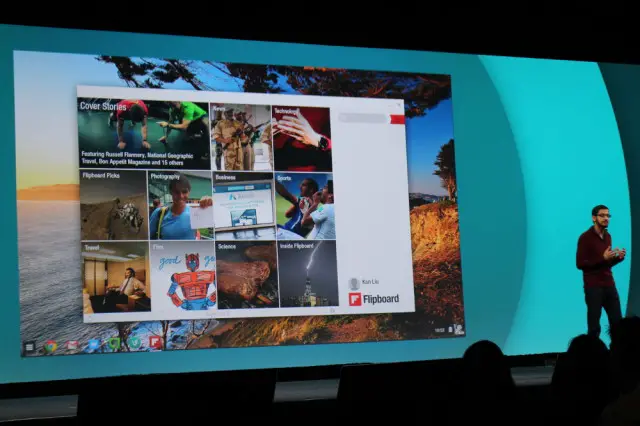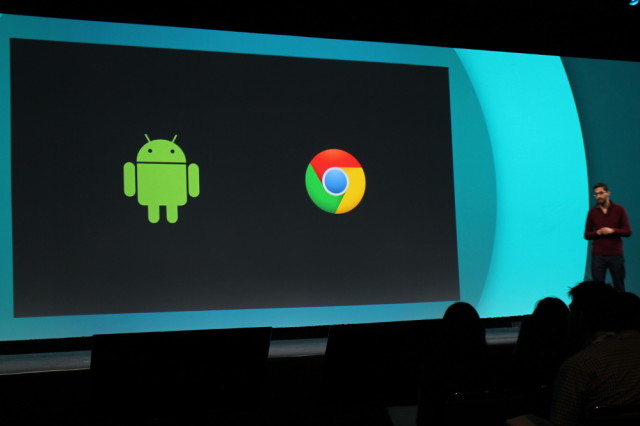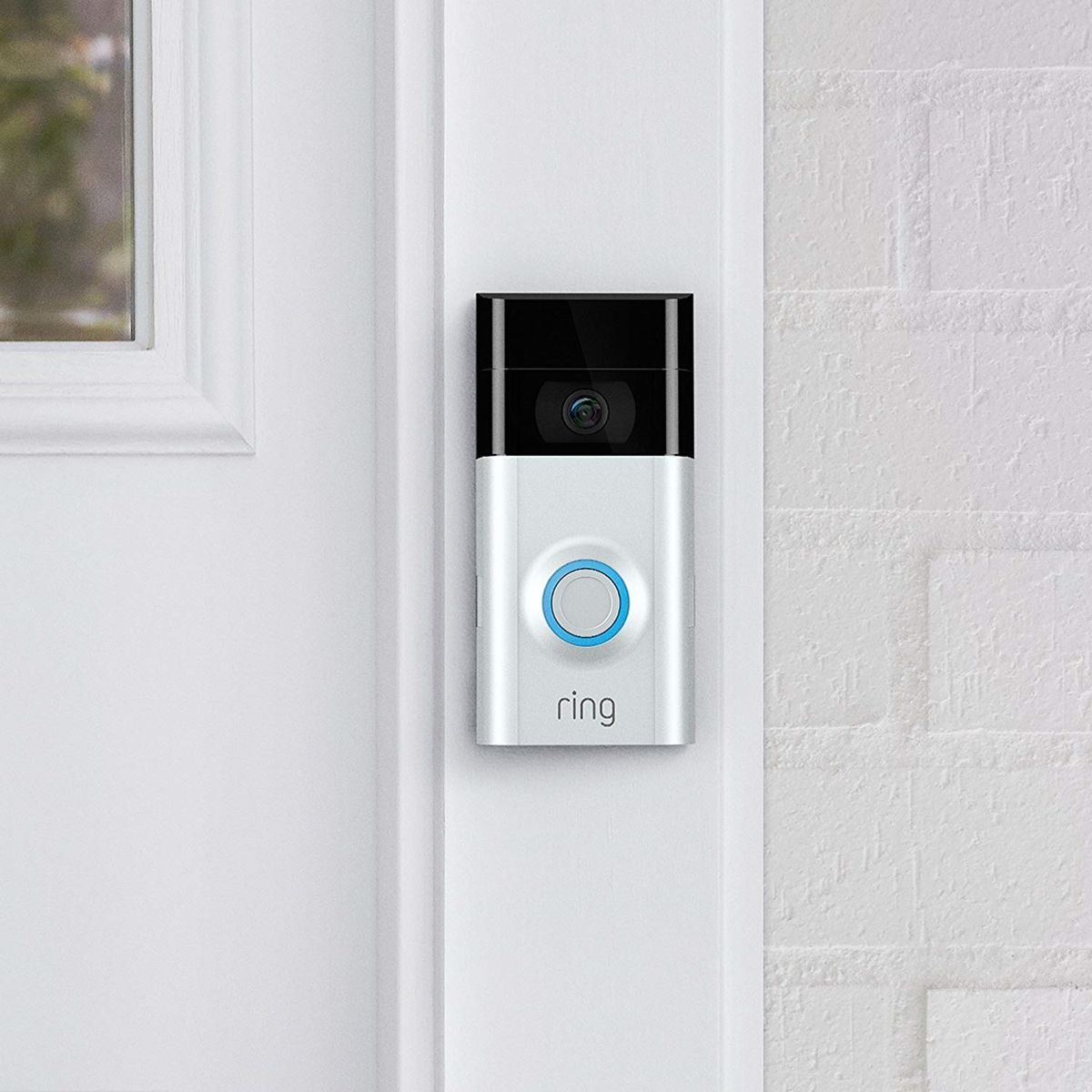Chromebooks just got a lot more useful. Today Google has announced several important new features for their web-based computers. A couple of these features are direct shots at Apple’s Cotinuity from iOS 8 and OS X Yosemite. Google wants to make it easier to use a Chromebook and Android phone together.
Your Chromebook will now be automatically unlocked when your Android phone is nearby. Notifications are mirrored to your Chromebook, including calls and texts. All of that is pretty neat, but to take it a step further they are making Android apps available on Chromebooks.
On stage they showed off Evernote running on an Android tablet, and then they opened the same app on the Chromebook. The app looked exactly the same, minus the Android navbar. Phone apps open as portrait windows, and landscape apps look like full desktop caliber applications. The line between Chrome and Android is getting very blurry.












Great integration of the two.. but why would they still need a chromeOS?
My gut feeling is that since it’s not a failing platform, (Google TV?) there’s no reason to build an Android OS for laptops. ChromeOS is (becoming) very popular and steadily growing. That said, it makes sense to have conformity with it as opposed to vice versa. From the looks of everything today, it certainly appears that Google is moving toward an Android umbrella, (Android TV, Android Auto, Android L, Wear…..) So there’s a good chance that in the future the ChromeOS could certainly be fully absorbed. The great thing about innovation, it never stops changing the landscape. What we know for fact today, is nothing compared to what we’ll know tomorrow, literally.
Never stops changing the portrait, either.
Great points. I guess we’ll just have to see what the landscape is like over the next couple years.
Same question I have. I don’t get the obsession with keeping the name chromeOS name. Just keep the browser as Chrome browser and make all tablets, phones, desktops, and laptops Android. I never understood chromeOS and understand the need for it even less, with the ability to run Android apps on chromebooks.
Why mess with it? The Chrome brand is working.
Yeah, I guess it’s not necessarily “failing,” but hasn’t gotten close to the steam that Android gained within the same timeframe, since first being released. Since I’m on the verge of needing a new cpu, chromebook hasn’t even been in consideration for me, but I have an Android tablet already. Just seems like using the familiarity that the Android name has gained, would prove more fruitful for Google than the chromeOS name.
Chrome has an insanely strong brand name, so chromeOS continues to gain some familiarity from that. the confusion between does it hurt it a little. Chromecast also gained pretty good noteriety. Although since chromecast runs a version of linux closer to android than chrome, we are really starting to split hairs.
Do you think Chrome has stronger branding than Android? Up until a couple years ago, the only thing I equated to “chrome” was Google’s browser (which I loved and still continue to use today) and I’m a tech enthusiast, so I’m not so sure people caught onto chromeOS. At the end of the day, I agree, it’s splitting hairs. And I personally don’t care what Google decides to do with branding, as long as they continue creating software that suits my needs as well as Android currently does, I’m fine with whatever they want to call things.
I’m not sure which is a stronger brand chrome vs. android, I’d imagine a lot of it would have to with # of desktop/laptop devices vs tablet/cellphone devices, which itself I’d imagine has to do with global sales. Chrome also has the benefit of being device and OS agnostic. Chrome runs in one form or another on windows, OSX, android, iOS, linux that’s a strong play. Plus at the end of the day, Google is big enough to create 2+ strong brands without much damage, it’s not wise to put all of ones eggs in ones basket. hedging is a wise investment strategy.
Yea I would have thought at this point ChromOS would have merged with Android and been the same OS. Kinda like Honeycomb once worked only with tablets and then became Android 4.x.
Android was built on ARM architecture.
ChromeOS was built with multi-architecture in mind (ARM, x86, x64).
Android is slowly becoming multi-architecture (5.0 will support ARM, x86, and MIPS), but it’s not quite there yet.
Android has supported x86 for *years* and x64 since at least 4.4 (maybe longer?). I don’t know about MIPS, but who really cares about MIPS anyways?
Officially?
There have been several products released that ran Android on atom processors going back to 2012 but as far as I know, they were all released running forked versions of Android that Intel had been working on, not Google (maybe with some help from the Goog, but it was still a fork). And their performance was pretty bad.
And with x64 support, Intel just barely released a version in April of this year, but again that’s not an official android release. It’s a fork. Chock full of bugs and performance issues.
A port/fork of android supporting x86 or x64 isn’t the same thing as android actually supporting x86 or x64 natively.
“but who really cares about MIPS anyways?” – well, Google does? MIPS is used in all kinds of embeded systems from wireless routers, cable modems, home control systems, set top boxes… all areas that Google is interested in.
x86 has been “officially” supported by Google since 4.0.x (which came out more than 2.5 years ago). There were working “unofficial” builds for x86 from the android-x86 project and Intel going all the way back to Android 1.6.
I’m less sure about x64, but as you said Intel has builds for x64, and I know they’ve been contributing code to the Linux kernel specifically for better Android support of x64 for some time now.
You’re right about MIPS… I hadn’t thought about Android TV or Android Auto, which could benefit from MIPS support. I was thinking of smartphones and tablets, which nobody uses MIPS for, and I seriously doubt there’s anybody here clamoring for a MIPS-based smartphone or tablet.
This is definitely a welcomed addition
Love that my $199 (actually $99 after Windows XP system trade-in) computer gets better without my having to do much of anything to it. Seriously, this is the first computer I’ve owned that’s gotten faster and better over time.
I want to see Hangouts running on my Chromebook and be able to send SMSes as if they were from my phone, not a GVoice #. Wonder if that’s possible…..
I do that with Airdroid today.
In fact, some of this stuff looks like it steps on Airdroid and Pushbullet turf. Not sure if that’s a good thing.
Was any timing on this disclosed? How soon will these apps be ready?
Yeah when is this coming ?
So theoretically a Chromebook could now also run Microsoft Office since there is Office on Android
Chromebooks could always run office….. I do it all the time for school….
This sounds great and makes Chromebooks a LOT more useful.
More importantly, I would like to see a program, or Chrome extension that adds all of this functionality to PCs too.
didn’t bluedroid or whatever try to do this? Never seen much use for most android apps on a pc.
although i’d be excited for notification mirroring (especially if it supported interactions unlike push bullet).
NOW, you say?
“Chromebooks can now run Android Apps.”
Are you sure that’s true?
They said they were making it easier for devs to PORT their Android apps to ChromeOS with minimal changes, but it’s still a port.
It’s not like the entire play store will be available on ChromeOS… right?
I say fuse both together and get “Android Chrome” or “Chrome Android”
ChromeOS/chromebooks now with Android apps/google play store has a nice ring to it.
I don’t think you’ll see Android w/full chrome support until android minimum specs are 2-4gb, which is a long long time away. Not to mention this might allow you to go around some carrier and mobile only app lockdowns, so it may be fought tooth and nail.
chrome, android, android silver…big chrome (silver?) droidbug?…hmmmmmmmm
So Chromebooks will have access to the Google Play Store and Chrome Web Store?